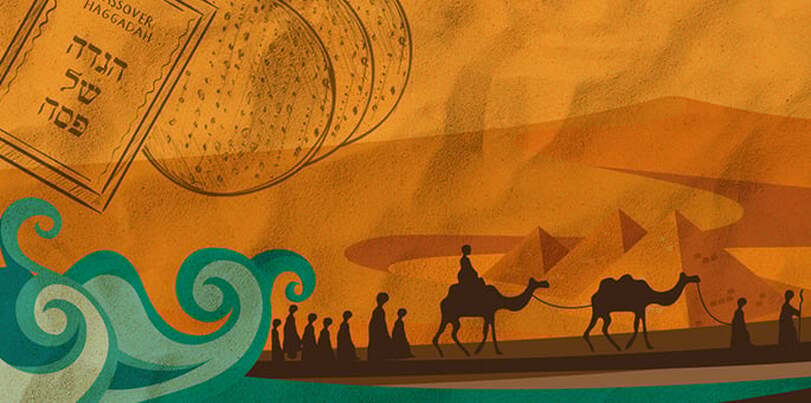 Rabbi David Etengoff Dedicated to the sacred memories of my mother, Miriam Tovah bat Aharon HaKohane, father-in-law, Levi ben Yitzhak, sister, Shulamit bat Menachem, sister-in-law, Ruchama Rivka Sondra bat Yechiel, Chana bat Shmuel, Yehonatan Binyamin ben Mordechai Meir Halevi, Tikvah bat Rivka Perel, Gittel Malka bat Moshe, Alexander Leib ben Benyamin Yosef, the Kedoshim of Har Nof, Pittsburgh, and Jersey City, the refuah shlaimah of Mordechai HaLevi ben Miriam Tovah, and the health and safety of our brothers and sisters in Israel and around the world. Parashat Bo continues the Torah’s emphasis on events leading up to Yetziat Mitzraim (the Departure from Egypt) that began in the prior two parshiot of Sefer Shemot. At this juncture, we are introduced to two mitzvot that portray the singular import of the Exodus: The first is the mitzvah of Zechirat Yetziat Mitzraim (13:3), the obligation to remember and mention the Exodus, and the second is the mitzvah of Sippur Yetziat Mitzraim, the recounting of the story of the Departure from Egypt (13:8). The 13th century anonymous author of the Sefer HaChinuch, a work that analyzes the Taryag Mitzvot (the 613 Commandments), begins his discussion of Sippur Yetziat Mitzraim with this formulation: The commandment to recount the Exodus from Egypt: To retell the story of the Exodus from Egypt on the night of the fifteenth of Nissan—each person according to their power of expression—to laud and to praise Hashem, may He be blessed, for all the miracles He performed for us there, as it is stated, “V’he’gaddatah l’vinchah… (“And you shall tell your son,” Sefer Shemot 13:8),” translation with my emendations, https://www.sefaria.org/Sefer_HaChinukh.21.1?lang=bi) The Sefer HaChinuch does not discuss Zechirat Yetziat Mitzraim, since it is nearly universally accepted among the Monei HaMitzvot (Compilers of the Taryag Mitzvot) that it is not counted among the 613 Commandments. In contrast, Rashi (1040-1105), in his gloss on the phrase, “zachor et hayom hazeh asher y’tzatem m’mitzraim (remember this day, on which you left Egypt, Sefer Shemot 13:8),” makes it clear that this statement represents a mitzvah of the Torah. Basing himself upon Midrash Mechilta d’Rabbi Yishmael, Parashat Bo 16, he explains “This teaches us that we have a daily [obligation] to mention the Exodus from Egypt.” My rebbe and mentor, Rabbi Joseph B. Soloveitchik zatzal (1903-1993), known as “the Rav” by his students and followers, supports Rashi’s reading and notes that “regarding the truth of the matter, the mitzvah [that is, the daily obligation to mention the Exodus] was really stated in the verse, ‘zachor et hayom hazeh.’” (Shiurim l’Zacher Abba Mori, II, page 152, translation and brackets my own) It is clear that the mitzvot of Zechirat and Sippur Yetziat Mitzraim are firmly based upon pasukim in our parasha. Yet, if the Torah commands us to remember and mention Yetziat Mitzraim, why are we also obligated in the mitzvah of Sippur Yetziat Mitzraim? To borrow from the language of the Haggadah: Mah nishtanah mitzvat Zechirat Yetziat Mitzraim m’mitzvat Sippur Yetziat Mitzraim (What is the difference between the mitzvah of Zechirat Yetziat Mitzraim and Sippur Yetziat Mitzraim)? The Rav states that his father, HaRav Moshe Soloveitchik zatzal (1879-1941) shared the opinion of his father, HaRav Chaim Soloveitchik zatzal (1853-1918) on this matter, and noted four differences between these two mitzvot:
The Rav added another distinction: The obligation of remembering does not require a person to proclaim praise and thanks [to the Almighty,] whereas, Sippur Yetziat Mitzraim is not only [an act] wherein we recite the wonders and miracles that were done for us, rather, we have the additional responsibility to give praise and thanks [to Hashem] … (Shiurim l’Zacher Abba Mori, I, page 2, translation and brackets my own) Whenever we recite Kriat Shema, we have the opportunity to fulfill the mitzvah of Zechirat Mitzraim. May the Almighty help us do so with kavanah (focus and intent) and may this spiritual awareness lead to a powerful recognition of the wonders and miracles He performed for us at that time, enabling us to praise and thank Him when we recount the story of Yetziat Mitzraim. V’chane yihi ratzon. Shabbat Shalom Past drashot may be found at my blog-website: http://reparashathashavuah.org. Please contact me at [email protected] to be added to my weekly email list. *** My audio shiurim on the topics of Tefilah and Tanach may be found at: http://tinyurl.com/8hsdpyd *** I have posted 164 of Rabbi Soloveitchik’s English language audio shiurim (MP3 format) spanning the years 1958-1984. Please click on the highlighted link: The Rav
0 Comments
Leave a Reply. |
Details
Archives
July 2024
AuthorTalmid of Rabbi Soloveitchik zatzal Categories |
- Blog: Rabbi David Etengoff: Parashat HaShavuah
- Sefer Bereishit 5784&5785
- Sefer Shemot 5784&5785
- Sefer Vayikra 5784&5785
- Sefer Bamidbar 5784 &5785
- Sefer Bereishit 5782&5783
- Sefer Shemot 5782&5783
- Sefer Vayikra 5782&5783
- Sefer Bamidbar 5782&5783
- Sefer Devarim 5782&5783
- Sefer Bereishit 5780& 5781
- Sefer Shemot 5780&5781
- Sefer Vayikra 5780&5781
- Sefer Bamidbar 578&5781
- Sefer Devarim 578&5781
- Sefer Bereishit 5778&5779
- Sefer Shemot 5778&5779
- Sefer Vayikra 5778&5779
- Sefer Bamidbar 5778&5779
- Sefer Devarim 5778&5779
- Sefer Bereishit 5776&5777
- Sefer Bereishit 5774&5775
- Sefer Bereishit 5772&5773
- Sefer Bereishit 5771&5770
- Sefer Shemot 5776&5777
- Sefer Shemot 5774&5775
- Sefer Shemot 5772&5773
- Sefer Shemot 5771&5770
- Sefer Vayikra 5776&5777
- Sefer Vayikra 5774&5775
- Sefer Vayikra 5772&5773
- Sefer Vayikra 5771&5770
- Sefer Bamidbar 5776&5777
- Sefer Bamidbar 5774&5775
- Sefer Bamidbar 5772&5773
- Sefer Bamidbar 5771&5770
- Sefer Devarim 5776&5777
- Sefer Devarim 5774&5775
- Sefer Devarim 5772&5773
- Sefer Devarim 5771&5770
 RSS Feed
RSS Feed
